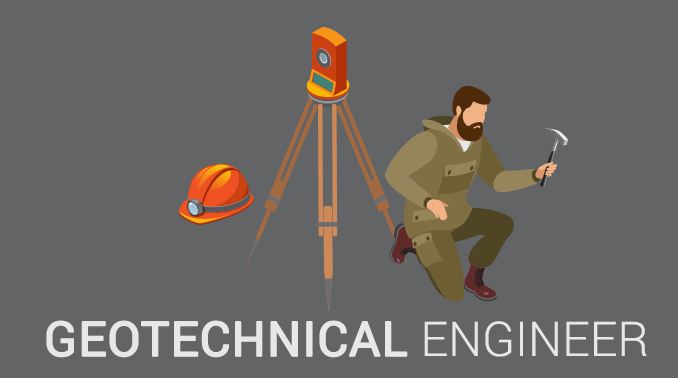The 5-Second Trick For Geotheta
The 5-Second Trick For Geotheta
Blog Article
What Does Geotheta Do?
Table of ContentsGetting The Geotheta To WorkThe smart Trick of Geotheta That Nobody is DiscussingGeotheta - An OverviewSome Known Factual Statements About Geotheta Geotheta Things To Know Before You Buy

They carry out site investigations, accumulate examples, do research laboratory examinations, and evaluate data to evaluate the viability of the ground for building and construction jobs - Engineer of Record. Based upon their searchings for, geotechnical engineers supply suggestions for foundation style, incline security, preserving structures, and reduction of geotechnical dangers. They collaborate with various other specialists, such as designers, architectural designers, and construction groups, to make sure that geotechnical factors to consider are integrated right into the general task layout and application
By analyzing the behavior and homes of soil and rock, they can determine prospective geotechnical hazards such as landslides, dirt negotiation, or slope instability. Their know-how helps avoid failures or crashes that might threaten lives and residential or commercial property. Below are some detailed obligations and obligations of a geotechnical designer: Website Investigation: Geotechnical designers conduct site investigations to collect data on subsurface problems.
They interpret the data to recognize the properties and behavior of the dirt and rock, including their strength, permeability, compaction features, and groundwater problems. Geotechnical Analysis and Style: Geotechnical engineers assess the information gathered throughout website examinations to evaluate the stability and suitability of the website for building projects. They execute geotechnical computations and modeling to assess elements such as bearing capacity, negotiation, incline stability, side planet stress, and groundwater flow.
Geotheta Things To Know Before You Buy
Foundation Design: Geotechnical engineers play an essential role in making structures that can securely sustain the intended structure. They analyze the soil conditions and tons demands to establish the appropriate structure kind, such as superficial structures (e.g., grounds), deep foundations (e.g (https://geotheta.webflow.io/)., piles), or specialized methods like dirt renovation. They consider variables such as negotiation limits, bearing capability, and soil-structure communication to create optimal foundation styles
They review construction plans, display site tasks, and conduct field inspections to confirm that the style referrals are adhered to. If unanticipated geotechnical problems develop, they assess the situation and give referrals for removal or changes to the design. Risk Evaluation and Reduction: Geotechnical designers assess geotechnical dangers and dangers connected with the task website, such as landslides, liquefaction, or soil erosion.

Collaboration and Communication: Geotechnical designers function very closely with various other experts associated with a task, such as designers, architectural engineers, and building teams. Reliable communication and partnership are vital to integrate geotechnical considerations into the general task layout and building and construction process. Geotechnical engineers give technical experience, response inquiries, and guarantee that geotechnical needs are satisfied.
Some Known Questions About Geotheta.
Below are some kinds of geotechnical designers: Foundation Engineer: Structure designers concentrate on developing and evaluating foundations for frameworks. They analyze the dirt conditions, lots demands, and website features to determine the most appropriate foundation kind and design, such as superficial foundations, deep structures, or specialized techniques like stack foundations.
They evaluate the aspects affecting incline security, such as soil residential properties, groundwater conditions, and slope geometry, and establish techniques to avoid incline failings and alleviate risks. Earthquake Designer: Quake designers specialize in analyzing and developing frameworks to endure seismic forces. They examine the seismic risk of a website, examine soil liquefaction capacity, and create seismic design standards to make certain the safety and security and durability of structures during earthquakes.
They carry out field testing, collect samples, and assess the gathered this website information to characterize the dirt properties, geologic developments, and groundwater conditions at a site. Geotechnical Instrumentation Designer: Geotechnical instrumentation engineers focus on tracking and measuring the actions of dirt, rock, and frameworks. They mount and preserve instrumentation systems that keep track of factors such as soil negotiation, groundwater levels, slope movements, and structural variations to examine performance and provide very early cautions of potential concerns.
Not known Factual Statements About Geotheta
They conduct tests such as triaxial tests, loan consolidation tests, direct shear examinations, and leaks in the structure tests to collect data for geotechnical analysis and layout. Geosynthetics Designer: Geosynthetics engineers concentrate on the layout and application of geosynthetic materials, such as geotextiles, geogrids, and geomembranes. They use these products to improve soil security, reinforce slopes, supply water drainage solutions, and control disintegration.
They have a tendency to be investigative individuals, which implies they're intellectual, introspective, and analytical. They are interested, systematic, logical, analytical, and sensible. Some of them are also social, meaning they're kind, generous, participating, patient, caring, handy, empathetic, tactful, and pleasant - Engineer of Record.
In the office environment, geotechnical designers make use of specialized software tools to execute calculations, create designs, and analyze data. They prepare reports, evaluation task requirements, connect with clients and employee, and coordinate task activities. The office setting supplies a conducive atmosphere for study, evaluation, and collaboration with other specialists associated with the project.
10 Easy Facts About Geotheta Explained
They frequently go to job sites to perform site investigations, assess geotechnical conditions, and gather data for analysis. These gos to include traveling to various areas, in some cases in remote or tough surfaces. Geotechnical engineers may do dirt tasting, conduct examinations, and screen construction activities to guarantee that the geotechnical elements of the project are being applied correctly.
Geotechnical engineers additionally work in specialized geotechnical research laboratories. In these centers, they conduct experiments, execute examinations on soil and rock examples, and examine the engineering residential or commercial properties of the materials. Geotechnical research laboratory engineers work thoroughly in these settings, dealing with screening devices, operating instruments, and videotaping data. They work together with other laboratory personnel to ensure exact and trusted testing results.
Report this page